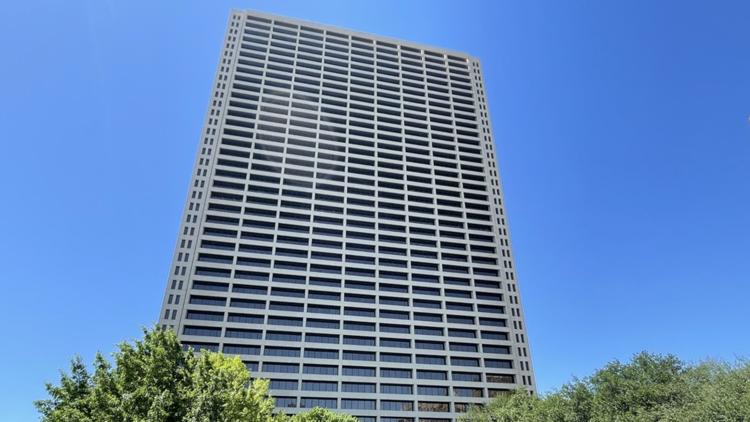FORT WORTH, Texas — Editor's note: This article was originally published in the Dallas Business Journal here.
Early this month, Pinnacle Bank Texas took possession of Fort Worth’s tallest tower after foreclosing on one of the loans tied to the office building, but that's far from the end of the story.
The bank wrestled away control of Burnett Plaza from Burnett Cherry Street LLC, an entity connected with New York City-based Opal Holdings. The back-and-forth legal spat is now coming to light through court filings and public documents, supplying a partial explanation for how a regional bank became landlord of the 40-story office building.
Ongoing legal wrangling means the situation is far from settled.
But Dallas Business Journal reviewed dozens of pages of documents and interviewed experts to get a better idea of what's happening with Burnett Plaza. What emerged was a picture of a contentious fight involving claims of fraud tied to a ground lease. This complex financial situation has big implications for downtown Fort Worth but it's a less dire situation for the market than some national headlines suggested after the foreclosure.
Burnett Plaza was facing financial issues well before the May 7 foreclosure auction. For months, lawsuits and liens had piled up from contractors alleging they had not been paid by Burnett Cherry Street LLC, an entity connected to Opal Holdings, for work on the building.
Burnett Cherry Street LLC and Opal alleged in a lawsuit filed April 2 that its loan was pushed into default and that Pinnacle is partly to blame for the liens because it hasn't released the funds needed to pay contractors.
Pinnacle countered in an April 26 legal filing that Opal, through the entities that controlled the building, wasn't adhering to financial requirements of the loan, leading it to start foreclosure proceedings earlier this year.
Pinnacle on May 7 foreclosed on its $13 million loan to Opal's Burnett Cherry Street. The bank won the foreclosure auction with a $12.3 million credit bid, giving it control over the building that measures about 1 million square feet and is home to tenants such as General Motors Financial and Kimley-Horn.
But the building is far more valuable than just that $12.3 million bid. An LLC tied to Opal had also taken out a $69.9 million loan from Pinnacle when acquiring Burnett Plaza in 2021 for $137.5 million, according to deed documents. Burnett Plaza was appraised this year for tax purposes at$120.5 million by Tarrant Appraisal District. The current value of the building will ultimately be determined by the market.
Another legal entity, Burnett Plaza Holdings LLC, is also involved. Deed documents indicate Burnett Plaza Holdings has ground lease loans totaling $86 million that involve UMB Bank as trustee. UMB declined to comment.
Pinnacle claimed in court documents that Burnett Plaza Holdings is affiliated with Burnett Cherry Street and that Opal founding member Shaya Prager engaged in a "string-along fraud" by misrepresenting the relationship between his company and the LLCs.
Opal denied that claim, saying in legal filings Pinnacle's allegation was "based on nothing more than its professed 'information and belief,' ... which is a patently improper basis from which to lob its grotesque and harmful accusations."
Israel Dahan — a partner at King & Spalding who represents Opal, Burnett Cherry Street and Prager — went so far as to say Opal does not own and never has owned the building; Burnett Plaza Holdings LLC does.
Jim Scott, a lawyer with Kelly Hart & Hallman representing Pinnacle Bank Texas, declined to comment on the litigation.
However, Pinnacle's foreclosure of the small loan means the bank has more control over the building and acts as the landlord. Pinnacle also holds the first mortgage for the building, said Evan Stone, managing partner at commercial real estate brokerage Goodwin Advisors.
"It's not an uncommon situation," said Stone, who's not involved with the building. "Other lenders are foreclosing on their mezzanine position. They don't always have a first mortgage to themselves."
The downtown Fort Worth office market is relatively healthy, with a vacancy rate of 12.4%, according to a first quarter report by JLL. For comparison, downtown Dallas had a vacancy rate of 21.6% at the end of 2023.
So exactly how such a prominent building fell into this kind of financial situation remains a bit of mystery. In its April 2 lawsuit, Opal alleged Pinnacle Bank pushed the smaller loan into default and "refuses to release funds needed to pay for tenant improvements causing the placement of a lien and the filing of a lawsuit" against the tower.
Pinnacle "has used ... unfounded defaults or potential defaults to take over the overall management and operations of Burnett Plaza,” according to the suit.
In its April 26 response, Pinnacle denied that claim and alleged Opal breached its contract and defaulted on the loan in numerous ways such as failing to meet a required debt ratio and allowing liens to be placed on the property. Pinnacle said Burnett Cherry Street owed more than $75 million across its two loans before the foreclosure.
Pinnacle "asserted its contractual remedies under the loan, including instituting the default interest rate ... and accelerating the maturity date of the loan and demanding payment of the entire unpaid principal balance," the reply stated.
Complicating the financial picture, contractors have filed lawsuits saying they are owed more than $1.6 million for work on Burnett Plaza. That includes a claim by Tarrant Construction Services, which in a March 5 suit said it hadn't been paid $1 million.



